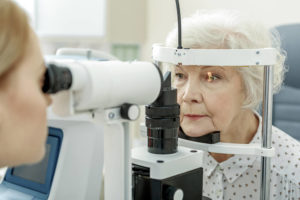
You use your vision for everything you do throughout the day. However, it’s easy to take your vision for granted until it is somehow taken away from you.
Cataracts are a normal condition that usually occurs with age. The lenses in your eyes can begin to become cloudy and over time, your vision is affected. Over 20 million people over the age of 40 have been diagnosed with cataracts and cataract surgery is one of the most common procedures worldwide.
Cataracts often develop painlessly and they can cause very few symptoms in the beginning. However, there are some symptoms that most patients will experience. Let’s look at the five most common signs of cataracts below:
- Blurry or hazy vision
Many cataracts patients will say they feel like they are “looking through a piece of glass.” As cataracts worsen, they can cause your vision to become blurry or dim.
- A glare or halo around lights
Light sensitivity is one of the most common signs of cataracts. A glare or halo will often start to form around light sources and this can cause bright lights to become painful.
- Difficulty driving at night
Largely due to their sensitivity to light, many cataracts patients struggle with nighttime driving. Halos often start to form around the light from streetlights or oncoming cars. If you suspect you have cataracts, you should try to limit your nighttime driving as much as possible.
- Double vision
Diffraction from the lenses clouding in your eyes can cause many patients to begin having double vision. Double vision should never be ignored — contact your doctor if you have been experiencing this symptom.
- Lens discoloration
Over time, your cataracts can cause the lenses in your eyes to develop a yellowish tint. This will make it harder for you to differentiate between different colors.
Did any of the signs on this list hit a little too close to home? The best way to protect your vision is by scheduling yearly comprehensive eye exams. If it’s been too long since you’ve had yours, contact our office today.

